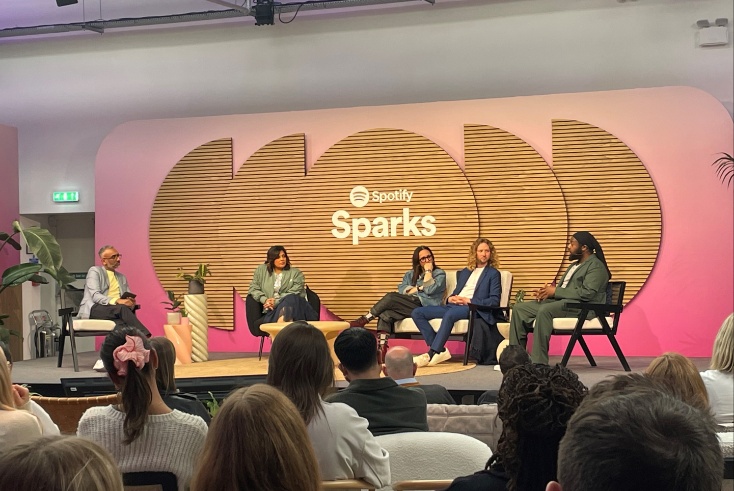‘We’re doing it wrong’: Calls to inject ‘joy and curiosity’ into DEI


“We’re doing it wrong,” Nishma Patel Robb, president of Wacl, told delegates at Spotify’s Sparks event.
On a panel hosted by Rak Patel, head of EMEA sales at Spotify, Patel Robb explained: “We’ve used DEI as a stick to beat everyone with: it became a finger-wagging thing, a shame thing, why haven’t you and you’re not trying hard enough on that.”
She called on DEI to be looked at differently, because the topic is currently “unpopular” and cannot be discussed “without getting cancelled”. There is also frustration at the speed of progress, which is either “stagnating” or, in some parts, “moving backwards”.
Patel Robb remarked: “If you want to create bloody good work that resonates with people, you’ve got to get smarter about who you’re going to reach. And if we flipped DEI to be a point of joy and curiosity and permission to laugh and get it wrong and permission to be curious, you wouldn’t have the fear.
“You have got to take the fear out if we’re going to drive the next level of progress.”
This was echoed by Chaka Sobhani, president and global chief creative officer at DDB, who called for an approach that allows for more humour and humanity.
Noting “how serious” everyone looked in the room, Sobhani explained that while it’s a serious topic that can sometimes get “uncomfortable”, she wanted to create “a shits-and-giggles version of DEI”.
“They’re just brilliant fucking stories,” she continued. “I’ve had a client who found out that I’ve got a wife and genuinely said, just very earnestly: ‘So are you the husband and is she the wife?’ And it’s not because she was trying to be a dick. She just didn’t know.”
While there are “initiatives and support structures that we have to put in place”, part of the discussion should also “allow people to say stuff without thinking: I’m going to fuck up”.
Meanwhile, Charles Parkinson and Ashley Samuels-McKenzie, co-founders of Unity & Motion and co-hosts of the How I Became podcast, stressed the importance of creating safe spaces that involve everyone in the conversation and a more understanding outlook.
Samuels-McKenzie said there was “a need for spaces” where people can ask questions about different cultures without feeling like they would be “persecuted”.
After asking delegates to put their hand up if they were a white, straight, middle-class or upper-class man and noting hesitation in the room, Parkinson said this was “not something you necessarily feel proud about”.
He concluded: “You have a choice. You can say: OK, I’m part of the problem and I’m going to hide and not be part of this. My message today is to get involved in DEI and in things that make the world a better place with enthusiasm, and also change the question to: how can I help? Just ask the question.”
Patel Robb highlighted “three key areas” to work on when it comes to DEI and creating different work: yourself, process and closing the loop.
First, she recommended individuals “get out of your bubble” by trying new things.
Secondly, Patel Robb acknowledged that “the biggest struggle” for marketers and agencies is to pitch “something different” that stands out from the “pretty damn bland” 80-90% of advertising, because it can be perceived as risky and requiring “effort and hard work” to sell the idea.
“Figure out your risk,” she said. Patel Robb encouraged marketers and agencies to go into meetings “armed with why this is a good thing to do” and be prepared to answer these questions: “What if we don’t do that? What if we don’t engage in the conversation?”
Thirdly and “most critically”, according to Patel Robb, work out how trying something different can be measured so that it can be done again — and not just through metrics. For instance, by “looking a little bit further” and “going deep into that community”, it’s possible to see the connection and impact of advertising.
